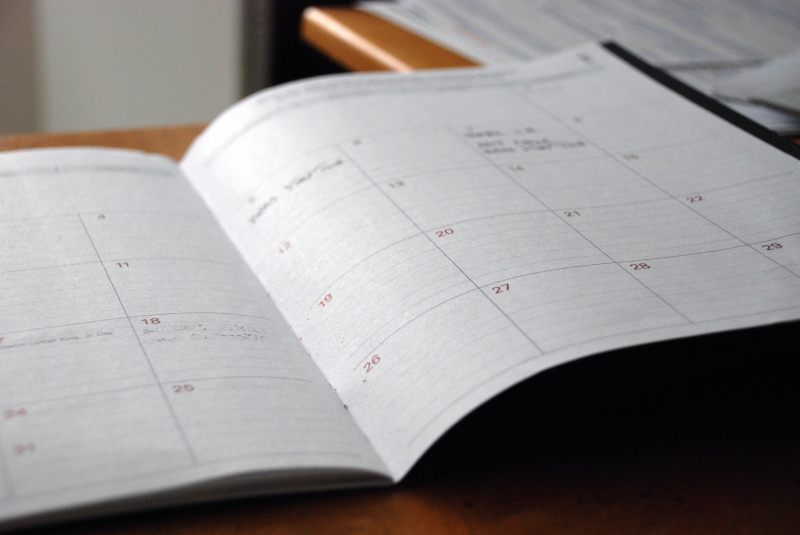Before classes: setting up a system
In this section, we will turn to an overview of your general time and life management system. Here is a list of things you will likely need to accommodate into your life:
-
Class schedule. The core of your timetable for the foreseeable future is your class schedule – and having it at hand at all times (at ITMO you can do it with the IS app – iOS/Android) can truly be life-saving when you need to plan any kind of meeting, from a catch-up with friends to a doctor’s appointment. Not only can you make sure you’re present in all of your classes, but also take into account your assignments and, for instance, keep evenings before a morning class free for any last-minute touch-ups.
-
Informal and formal events. As you might know by now, ITMO has an abundance of student clubs for all tastes, as well as a bunch of regular events – from exhibitions to conferences. Moreover, you would most definitely want to hang out with friends and you’re bound to be tempted to visit at least some of St. Pete’s multiple museums, parks, theaters, or concert halls. As it can get overwhelming if you try to simply keep it all in your head (or on separate pieces of paper), it is really convenient to have all such plans in one place. At a pro level, you would also have reminders about such things – to make sure you never miss them.
-
Deadlines. A conference application or a final or mid-semester assignment that you’re given in September and forget all about by the second week of classes – basically anything that you have to complete by a specific date falls into this category. Keeping those key dates in mind and within your system – be it a journal or a digital calendar – is a game changer.
-
Appointments. You can schedule those not only with doctors but also with your supervisor or lecturer – and for all of those you’d better be present. It’s also nice to not have them overlap with any other activities on your agenda.
-
Birthdays and other important dates. First, you are likely to make a lot of new friends and it might be a challenge to remember their birthdays. Second, as you’re now away from your family, you might get too caught up in your study routine and forget a family celebration (like the day your parents got married). Having reminders about such things can help you maintain your relationships and ensure you never forget an important date.
As for the tools you can use, there is a whole universe of them by now. We have described the most popular digital ones in one handy guide, but you can also check out different types of journaling, such as bullet journals, or implement a whole organization system, such as GTD, which we’ve covered in a series of blogs.

Paper-based planner. Credit: Eric Rothermel (@erothermel) on Unsplash
Two key things to consider when choosing your perfect tool:
-
Notes about your events and deadlines should be movable so you can quickly edit your schedule if a class is cancelled or your friend asks to meet up earlier. It’s easier to implement in a digital calendar, but you could also keep them on stickers or use pencils or erasable pens if you are more of a pen-and-paper person.
-
It can be beneficial to have them all in one place. So that, say, you can open your Google Calendar or a page in your paper journal and see that on Friday you have an essay due, classes from 11 am to 3 pm, and a club meeting at 5 pm. Sometimes, if you keep reminders in their own special app, they can get lost because you use your other to-do lists or agendas more often.
Credit: Jeswin Thomas (@jeswinthomas) on Unsplash
In class: be the master of your notes
At ITMO, you are offered quite a selection of courses – from theory-laden core subjects to practical soft skills classes, and you are bound to want to make notes in class so as not to forget the key ideas. Here, too, there is a couple of things to consider:
-
Decide where you want to make notes. It can be an app, a system of Google Docs or Word files, a couple of good old notebooks, or a binder. It can be tricky to say what fits you best if you’ve never had to take notes before, but it’s quite an important decision to make. It might be useful to ask yourself if you like to doodle during class (some say it helps them concentrate), if you are going to be sharing your notes with groupmates often, or if you are ready to take your laptop with you as opposed to a couple of notebooks. Depending on your answers, you can choose to go digital or stay analog.
-
Consider different note-taking methods. They, too, might help you choose your digital or paper weapon in the battle for knowledge. There are a bunch of overviews of the most popular methods online, for instance, here or here. In this aspect, too, practice will help you see which one suits you best. The most important criteria here are convenience in both note-taking and revision.
-
Set up a note-keeping system as soon as possible. Once you’ve decided to stick to either of the two or their combination, you can quickly create a system for storing your notes. A notebook per course or one big binder with sections? A folder on your laptop? A database on Notion? A Google Doc with links to other docs – one per course? It’s also good to consider where you’ll keep all the associated files or links. And you should do it early so that you don’t get lost under an avalanche of notes at the end of the semester. Instead, you will simply open a designated folder/notebook/section whenever you need it – and find what you are looking for.
-
Transfer any important course dates into your planner of choice. As soon as your lecturer mentions a date, put it into the calendar you’ve chosen at the previous step. It can be a test, an assignment due date, or an upcoming job market – and that way you definitely won’t miss it.
This might seem like a lot to think about, but after the initial hassle, you will feel that you are on top of everything and taking notes (or reviewing them) will always be a pleasure.
Credit: Dollar Gill (@dollargill) on Unsplash
After classes: revise like a pro
Speaking of reviewing your notes, here, too, there is a couple of handy routines to be introduced to make your life easier and let the exams feel like a breeze:
-
Review your notes regularly. First, you can look through them right after class to see that you can read them and recap the lecture. Afterwards it can be right before every class or at a specific time during the week depending on your timetable and the intensity of a particular course. This will definitely do wonders in terms of keeping you engaged in the material and well-versed for any unexpected tests or lab projects. Also, when you are reviewing notes regularly, you get the chance to identify any gaps in your understanding early on and ask your lecturer about them at the very next class.
-
Plan your revision and reading. Sometimes if your course is particularly heavy on terms or theoretical concepts, you’ll need to read a lot of chapters or papers and devise a more complicated revision strategy. One popular tool here are flashcards, paper-based or digital ones (check out Quizlet or Anki) – they are good for quick revision. As for reading, you can simply put in the time you are going to do it in your planner and keep your preferred notebook at hand so that you can add any key ideas right into the relevant subject doc or section.
-
Consider organizing a study group. It’s always more fun to study in company – even if it’s only your friend quietly joining in over a Zoom call. You can revise or read together and then discuss what you’ve learned – it works even if you are studying different subjects. You are bound to have heard that when you explain something to someone, you get a better understanding of it yourself, so this method can be beneficial for everyone involved. Plus, it can be an additional motivation boost as well as a way to keep you accountable – so that you show up and revise on a regular basis.
As an added bonus, here is our article on the best memorization techniques that are likely to be your go-to life-savers during exams or tests.
Credit: Marvin Meyer (@marvelous) on Unsplash
Summary
We’ve equipped you with a checklist of things you should consider at the start of your school year: where to keep your schedules and crucial dates; how to keep notes and not drown in them; when and how to revise. Whether you implement them all or pick a few that work best for you, we hope that your year will be a time manager’s success and you will have fun and ace any test that comes your way.
If you would like more tips on organizing your life, check out our story on personal finances. And if you think you might experience stress at the start of the school year or before an upcoming test, head here for stress management tips and here for self-care 101.




